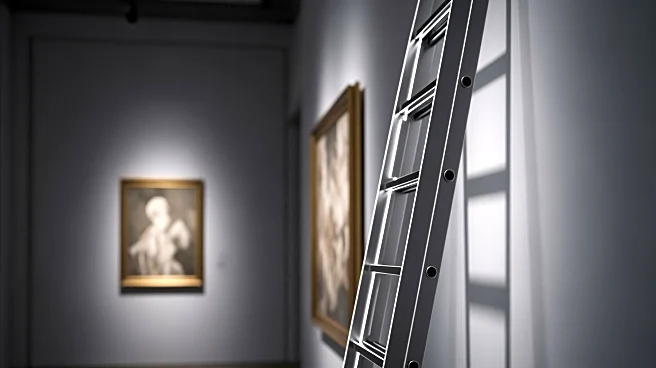What's Happening?
A German company, Böcker, based in North Rhine-Westphalia, found itself unexpectedly linked to a high-profile heist at the Louvre Museum. The perpetrators used a mechanical lift, manufactured by Böcker, to access the museum's terrace and steal crown jewels
valued at €88 million. The heist, which lasted approximately seven minutes, involved four individuals who threatened guards with angle grinders. In response to the incident, Böcker's management used the situation for marketing, posting a humorous ad featuring their lift with the slogan, 'When you need to move fast.' The ad has been well-received online, with many praising the company's clever marketing strategy. The lift was reportedly sold to a French rental firm, from which the thieves allegedly borrowed it under false pretenses.
Why It's Important?
This incident highlights the unexpected ways in which businesses can find themselves in the spotlight due to unforeseen events. For Böcker, the heist has turned into a marketing opportunity, showcasing the power of quick and creative responses in business. The positive reception of their ad demonstrates how companies can leverage unexpected situations to enhance brand visibility. Additionally, the heist underscores the ongoing challenges in securing cultural heritage sites, prompting discussions on improving security measures at such institutions. The event also raises questions about the responsibilities of equipment manufacturers in ensuring their products are not misused.
What's Next?
The Louvre heist is likely to prompt a review of security protocols at major cultural institutions worldwide. French authorities are expected to intensify their investigation to recover the stolen items and apprehend the culprits. The incident may lead to increased scrutiny on rental firms and their processes for verifying clients, potentially resulting in stricter regulations. For Böcker, the company may continue to capitalize on the publicity, possibly leading to increased sales and brand recognition. The broader implications for the security industry could include innovations in surveillance and access control technologies.
Beyond the Headlines
The ethical implications of using a crime for marketing purposes may spark debate about corporate responsibility and the boundaries of humor in advertising. While Böcker's approach has been largely praised, it raises questions about the appropriateness of capitalizing on criminal activities. This incident also highlights the cultural significance of the stolen items, emphasizing the need for robust international cooperation in protecting and recovering cultural heritage. The heist could lead to a reevaluation of how museums and cultural institutions balance accessibility with security.
















